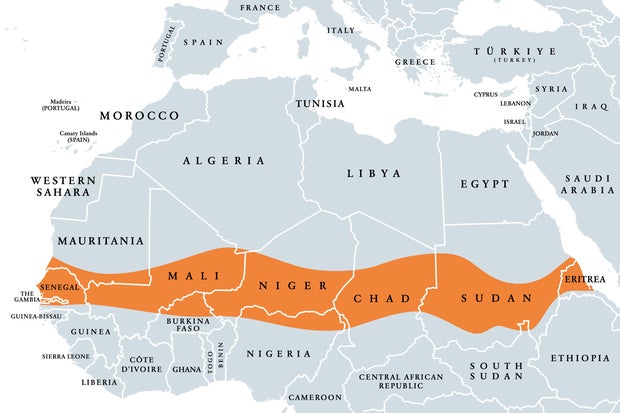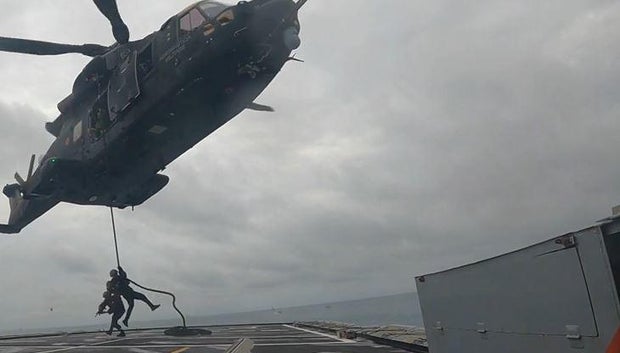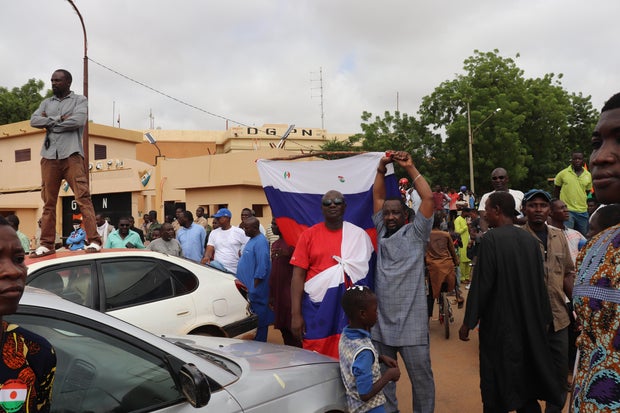Tamale, Ghana — On a dusty airport runway in the city of Tamale in northern Ghana, special military agents from across Africa move stealthily. Shots ring out as they converge on the airport and arrest armed militants who are holding him hostage.
It is not an actual attack, but just one of the “Flintlock” exercises, the US military’s main anti-terrorism training event in Africa, which is now in its 20th year.
Special operations teams from the US Military Command in Africa, along with NATO allies, are carrying out exercises alongside soldiers from countries such as Ghana, Ivory Coast, Chad, Mauritania, Nigeria, Libya and Morocco.
In the exercise witnessed by CBS News, elite forces rescued hostages from a simulated attack on an airport. It’s a very real scenario in the vast region of North Africa known as the Sahel, which is considered the epicenter of the global fight against ISIS and al Qaeda franchises.
Getty/iStockphoto
The Sahel stretches from Mauritania in the west through Mali, Burkina Faso and Niger to Eritrea and Djibouti on the east coast of Africa and is home to the world’s fastest-growing and deadliest terrorist groups. .
Ghana is one of the few countries in the region that has managed to prevent the rapid rise of violent extremism – by blocking any potential incursions before they reach its borders.
General Frank Tei of the Ghana Armed Forces told CBS News that this was vital because “once you allow terrorist activities in a particular country to fester and flourish, then that place can become a base from which to many other terrorist activities may spread.” the globe.”
This is exactly what the US fears and is trying to help prevent.
AFRICOM Deputy Commander Lt. Gen. John Brennan told CBS News that Exercise Flintlock is not just about training African forces to defend themselves and fight terrorism.
“We offer things that are meaningful in the long term – sharing democratic values, instilling the rule of law,” he said.
But that hasn’t worked out so well in the last decade. There was 11 coups d’état in the Sahel alone during this period, and at least 14 leaders of these armed overthrows of the government were trained in Flintlock.
Brennan told CBS News that the military tracks these leaders, and while there are strict rules of engagement with any country whose government has been overthrown by a military junta, “the hope is that you stay in touch with the military partners and then pull them away from military-led governments that never last.”
So how can the US ensure that the skills taught at events like Flintlock are not later weaponized and used to subvert democracy?
Brennan is quick to point out that executing a coup is a political maneuver, not a military one.
“We teach them how to protect their forces in combat and then conduct successful counter-terrorism operations. This has nothing to do with overthrowing a government. It’s just that some of the people we train are in the military and have been involved in some of the coups state,” he said. “But history shows… that democracy ends up prevailing in many countries.”
Flintlock has expanded to include maritime training – including rappelling onto a moving warship hijacked by armed militants. American forces, along with Italian and Dutch soldiers, put African troops to the test on a frigate off the coast of Ghana.
CBS News
This aspect of the exercises is increasingly important given that the Sahel region extends to the Red Sea, where the Iranian-backed region Houthi rebels have launched attacks targeting international ships and US naval vessels.
The annual Flintlock training operation – organized this year by Ghana – could not have come at a more crucial time for the US military, as American influence is undoubtedly at a profound level. decline across the vast African continent.
The US faces strong competition. China offers African national leaders trade deals and Russia offers military aid, all with very few strings attached. Washington, meanwhile, was forced from a key front line in the fight against terrorism after the more than 1,000 soldiers that AFRICOM had stationed in Niger were ordered to leave the country until September, after a coup d’état last year.
Djibo Issifou/image alliance via Getty Images
The US has two military bases in Niger, including a drone command center in the city of Agadez, which cost more than $110 million to install.
Russia quickly intervened to exploit the power vacuum created by the coup. Mercenaries of old Wagner Groupnow called Africa Corps and directed by the Russian government, it arrived in Niger in April.
In a scenario that not long ago was unimaginable, Russian and American forces now occupy opposite sides of the same extensive air base.
This set off alarm bells in Washington, and US Ambassador to Ghana Virginia Palmer stressed to CBS News that African nations should understand that Russia’s supply of security forces is not completely unfettered.
“It is important that our African partners understand that what the Russians are offering is perhaps regime protection – certainly not national security,” Palmer said.
She said that African countries pay for the services offered by Moscow, and at a cost that “is extraordinarily high”.
Niger is rich in uranium, which can be used to make nuclear weapons. What Russia offers is military strength in exchange for mineral wealthbut unlike the US, the agreement does not include potentially complicated human rights issues.
“But time will tell that this decision will probably not be a good one,” said the ambassador. “So, you don’t give your kids ice cream for dinner every night because they want it, right? You feed them vegetables, spinach, things that are good for them…instant gratification is probably not a recipe for success. “
US law restricts the provision of military aid to armed forces found guilty of human rights violations, but many leaders on the continent accuse Washington of double standards – saying the US withholds aid from some African nations while giving the Israel billions of dollars despite global condemnation of his actions in war in Gaza.
It’s an accusation Brennan disputes.
“I don’t think there is a double standard,” he told CBS News. “I can tell you our values and the people we partner with – even after the blows – we are still able to influence them.”
African countries argue that they not only need training, but resources and modern military equipment if they hope to combat rising extremism.
Brennan stressed that the US carries the weight of the entire NATO alliance, unlike its competitors, but admitted that Washington must “be able to provide adequate resources to our partners and really expand the relationship with them… to help make Africa prosperous”. , free and a partner of choice.”
With Flintlock, the US promises long-term investments on the African continent. But that long-term security strategy is competing for African partnerships amid a rapidly growing terrorist threat, on a battlefield teeming with malign actors.
bol co
jogo de terror online
novela sbt ao vivo
wishlist
musica terra seca
taça png



























